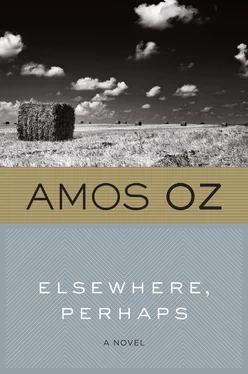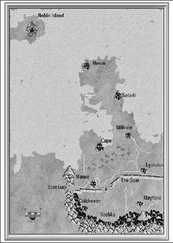For some days we scrutinized the faces of Reuven and Bronka, looking for signs. "He who sows the wind will reap the whirlwind," said Grisha Isarov, parodying the truck driver's cryptic style of utterance.
Einav, quietly waiting for the end of her pregnancy, said to her husband Tomer one evening:
"He's in the news, your father."
Tomer shrugged his shoulders and said nothing.
"I think you ought to do something about it. It's your family, after all."
But Tomer, whose young body had no rival in the arduous work of haymaking, gave his wife a sneering look, spread out his massive arms and said:
"Why me? I'm not his father. If the old man wants to make a fool of himself, good luck to him. Mother's not much better than he is."
True, Bronka is no better than her husband. It was she who started it all. But this fact does nothing to relieve her present unhappiness. Often, in bed, she turns her face to the wall and cries. Reuven bites his lip and does not talk about it. What can he say? He strokes her cheek affectionately and says nothing. His heart is heavy. He has not changed his habits, though. Every evening he crosses the lawn to Bronka and stays with her until just before Ezra gets back. But for some days now he has resumed the habit of the early days of their friendship, when it was still pure and intellectual. He is content to sit with her, drink coffee, munch grapes, talk awkwardly about art, until Bronka buries her face in her hands and collapses into long fits of sobbing.
If there is a letter from Zechariah-Siegfried in Munich, Bronka gives it to Reuven so that he can read his wife's brief lines. Then they sit side by side on the divan, holding hands. Reuven is as silent as a boy who is in love for the first time. Bronka, too, is silent. She is knitting a hat for her future granddaughter. Sometimes he brings a book with him, and they read it together, as in the good old days. Once Bronka gazed at Reuven's lips and said:
"What's going to happen? Tell me, tell me."
"It's going to be bad," said Reuven.
Still the worst did not happen. It is true that Noga sometimes woke up in the middle of the night and slipped through the darkness behind the shrubbery to meet the man on his return. But Ezra, with clumsy affection, rested her head on his sweaty chest, stroked it consolingly, and sent her back to bed. Once he even kissed her. Mundek Zohar, who was on duty that night, saw it with his own eyes and is ready to swear to it, and Mundek is a reliable witness. But it was so dark that the watchman could not see the girl's hot tears, and so he misjudged the nature of the kiss. It was a warm-hearted, paternal kiss, the purest thing in the world.
At the end of the week came the hamsin. From the mountain range in the east a murderous dryness flowed down to engulf us. The sky was gray, as if the desert had risen to float upside down over our tiny roofs. The heat tore at our vitality with its cruel claws, bringing desperate weariness, tormenting the body and oppressing the soul. Hens died by the dozen, despite the elaborate cooling system. Obstinacy took hold of the cows, and Herbert Segal was reduced to driving them into the milking shed with a whip. The trees grew gray and whispered drily. Scorched yellow patches appeared in the lawns. The men and women of the kibbutz quarrelled violently over trifles. Decency restrains us from relating the words that Fruma Rominov hurled at Bronka Berger on one of these terrible days. But this much we may say, that Bronka, shaken, arrived at Reuven Harish's room during the afternoon, beckoned to him to come outside, so that the children should not hear, and announced breathlessly that she could not put up with any more of it, and that it was up to him, for God's sake, to do what any real father would have done long ago.
And so it was Fruma Rominov's judgment which brought about, even indirectly, the conversation between father and daughter that up to now Reuven Harish had tried to avoid.
They were strolling together in front of the kibbutz office. It was eight o'clock in the evening. The air was dark and stifling. They spoke softly.
"I wanted to ask you if you think, Noga."
"What sort of question's that, Daddy? I don't understand what you mean."
"If you think. If you've thought a single thought these last weeks, or if you've given up thinking altogether."
"I'm not the tourists, Daddy, so please talk frankly to me, don't beat about the bush."
"I'll talk, Noga. I'll talk. I'll talk in a moment. I won't beat about the bush. And I want you to talk to me, too, completely openly. Sincerely."
"Don't I always?"
"Perhaps. Tell me, Noga, do you know what people here have been saying about you recently?"
"What have people here been saying about me recently, Daddy?"
"You know very well what they've been saying. Gossip. Nasty gossip."
"It's always unhappy people who say unkind things."
"I… I want us to understand each other, Noga. Don't force me to say unkind things, too."
"Why, are you unhappy?"
"Why are you fighting against me, Noga? It hurts me. I don't want us to fight. I want you to be happy."
"It's hot, Daddy. I'm hot. We're all hot. It's the hamsin. Why do you want to talk about gossip now? Why do you think that life is all about talking? There are other things. Not just words. Words aren't everything. Why must you always explain everything? Why has everything got to be explained? The sky won't fall if something isn't explained."
"There are things…"
"Yes. I know. There are things. Fruma said something nasty to Bronka. I know, Dafna heard it and told me I hate words. It's because of those words that you've come to talk to me now, when we're so hot. That's enough. Let's stop."
"Never mind about Fruma and never mind about Bronka. I want to talk to you, Noga. About you."
"You want to talk and you talk all the time but you don't really talk."
"I am talking. I'm talking about your new… friendship, to call a spade a spade. I only want to know one thing: if you think at all."
"Friendship?"
"Yes."
"Ezra?"
"I… yes. Ezra."
"Tell me, do you feel… embarrassed? Do you find it difficult to ask me things straight out? I've got to keep away from Ezra because Bronka… Oh, it's simple, it's simple, Daddy, so simple, and you're walking on tiptoe as if I was made of glass. I'm not made of glass. I understand. It's simple. Either you and Bronka or me and Ezra, and you were first, so you have first claim. It's so simple, Daddy."
"Noga… Stella, listen… Why do you… Why do you have to put it… Listen to me for a moment."
"I'm listening, Daddy, I'm listening to every word, all the time. You don't have to ask me to listen. I'm all ears."
Reuven Harish is a little perplexed. In his embarrassment he tugs lightly at his upper lip, searching for the right words. The heat blurs his mind. The perspiration from his hand smudges his face, and the perspiration from his face sticks to his hand. A strange stabbing stirs in his chest but dies down before it becomes painful. Stella, meanwhile, a naughty little deer, turns her back on him and paws the earth with her foot. On her face is a grimace, which is almost a smile. Reuven tries to stroke her neck. She moves out of reach.
"Let me put it another way, Noga. Look. You're not a child, right? I'm not trying to interfere with your private life. But I don't want you to ruin your life. That's all. That's the only thing I'm talking about."
"You're sweet, Daddy," Noga says suddenly. "You're really sweet."
Her face shines in the dark. But her teeth, strangely, chatter as if she is ill. He's suffering. He's suffering, and now he's going to start talking about Mother. Oh, poor Daddy, silly Daddy, if only you realized that I'm on your side, only I can't say so because…
Читать дальше












